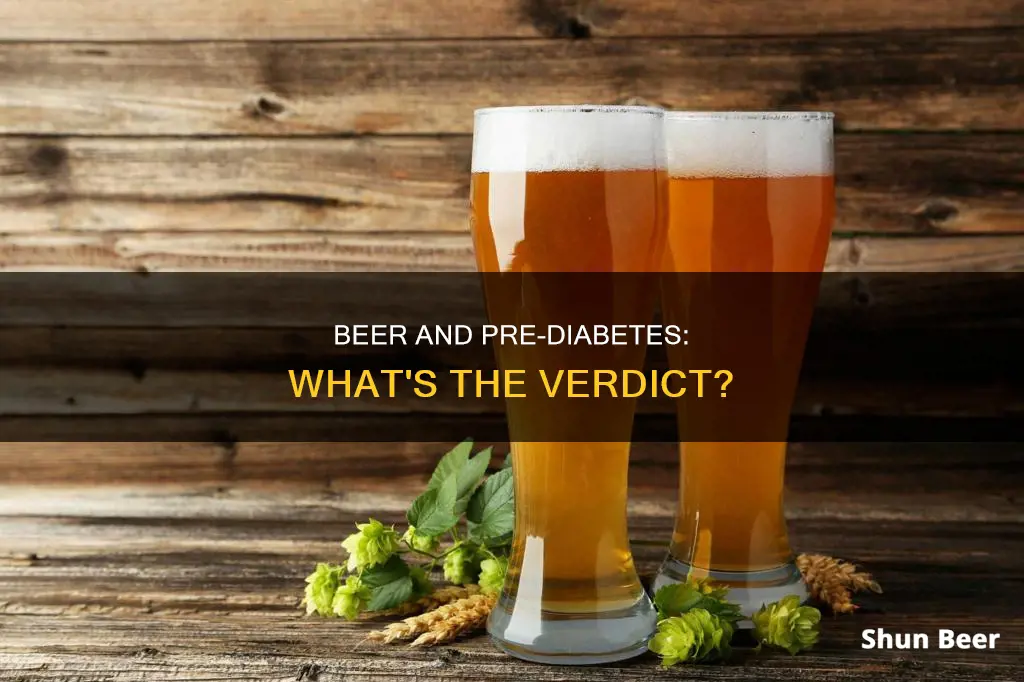
If you have prediabetes, it's important to watch your food and beverage intake carefully. Alcohol can interfere with insulin function and disrupt healthy blood sugar regulation, so experts recommend limiting or avoiding it altogether. However, if you do choose to drink, it's best to stick to light beers, dry wines, spirits with zero-calorie mixers, or hard seltzers. These options have lower calories, carbohydrates, and sugars, which can help prevent blood sugar spikes and keep you healthy. Remember to always drink in moderation, stay hydrated, and monitor your blood sugar levels.
| Characteristics | Values |
|---|---|
| Alcohol recommendation for pre-diabetics | No more than one drink a day for women and up to two drinks a day for men |
| Alcohol recommendation for people with diabetes | No more than one drink a day for women and up to two drinks a day for men |
| Alcohol recommendation for pregnant women | None |
| Alcohol's effect on blood sugar | More than one or two drinks can decrease blood sugar level, sometimes causing it to drop to dangerous levels |
| Alcohol's effect on weight | Alcoholic drinks are usually high in calories, making it difficult to lose excess weight |
| Alcohol's effect on triglyceride levels | Alcohol may increase levels of triglyceride |
| Alcohol's effect on blood pressure | Alcohol may increase blood pressure |
| Alcohol's effect on appetite | Alcohol stimulates your appetite |
| Alcohol's effect on judgement | Alcohol can affect judgement, causing you to make poor food choices |
| Alcohol's effect on liver | Alcohol competes with your liver’s ability to make glucose when your blood sugar is low |
| Alcohol's effect on medication | Alcohol can interfere with the positive effects of oral diabetes medication or insulin |
| Alcohol's effect on neuropathy | Alcohol can make neuropathy (nerve damage) worse |
| Alcohol's effect on sleep | Alcoholic drinks can stop you from sleeping properly |
| Alcohol's effect on cancer and heart disease | Alcohol can lead to certain cancers and heart disease |
What You'll Learn

Beer and diabetes: is it safe?
If you have diabetes, drinking alcohol may be safe, but it's important to be aware of how it can affect your body and how to manage this. It's best to consult a doctor about your individual circumstances, but here are some general guidelines.
Alcohol and diabetes
Drinking alcohol can affect your blood sugar levels, and it can be dangerous for people with diabetes to drink more than one or two drinks, as this can cause blood sugar to drop to dangerous levels. This is especially true for those with Type 1 Diabetes, or those taking insulin or diabetes pills that stimulate the release of insulin. Alcohol can also affect other medical conditions associated with diabetes, such as nerve damage, eye disease, and high blood triglycerides. It's important to be cautious and seek medical advice if you have any concerns.
Moderate alcohol consumption (no more than one to two drinks per day) is generally considered safe for most people with diabetes. However, it's important to drink slowly and always with food, as drinking on an empty stomach can lead to hypoglycemia. It's also important to monitor your blood sugar levels regularly before, during, and after drinking, as the risk of hypoglycemia can last up to 24 hours after drinking.
The specific guidelines vary slightly depending on the source, but generally, it's recommended that women have no more than one drink per day, and men have no more than two drinks per day. Binge drinking is strongly discouraged for health and safety reasons. It's also important to stay within government guidelines, which recommend not drinking more than 14 units per week, spread over at least three days.
Choosing the right drink
When it comes to choosing a drink, it's best to opt for lower-carb and lower-alcohol options. "Light" beers tend to have the fewest carbs (usually five grams or less per serving) and a lower alcohol content. Craft beers like IPAs and stouts tend to be much higher in carbs, calories, and alcohol, so it's best to stick to just one serving.
If you're a wine drinker, red wine is generally considered the healthiest option due to its high antioxidant content. Red wine is linked to a reduced risk of heart disease and diabetes-related complications such as diabetic retinopathy. White wines, especially Champagne, can also have a low carb count, but it's important to choose dry and brut varieties, as these are lower in sugar.
For liquor, distilled spirits or hard liquors contain few to no carbs, but it's important to be cautious as they can cause hypoglycemia, especially if consumed on an empty stomach. Gin, rum, vodka, and whiskey all contain zero grams of carbs per serving, but it's important not to mix them with sugary juices or sodas, as this can cause a dangerous spike and dip in blood sugar levels.
Other considerations
In addition to the type of drink, there are a few other things to keep in mind when drinking with diabetes:
- Always wear a medical ID bracelet or other jewellery that indicates you have diabetes.
- Carry a source of carbohydrates, like glucose tablets, in case of low blood sugar.
- Let your friends know about your diabetes and the symptoms of hypoglycemia, so they can help keep you safe.
- Be mindful of the ABV (alcohol by volume) of your drink, as this can affect the carb content.
- Check the serving size, as this can also impact your blood sugar levels.
- Drink plenty of water to stay hydrated.
Lexapro and Alcohol: Is It Safe to Drink Beer?
You may want to see also

Alcohol's effect on blood sugar levels
Alcohol can have a significant effect on blood sugar levels, and this is especially true for people with diabetes or prediabetes. Drinking alcohol can cause blood sugar to rise, and consuming more than one or two drinks can lead to a dangerous drop in blood sugar levels, which is more likely for people with Type 1 Diabetes. This is because alcohol interferes with the liver's ability to produce glucose when blood sugar is low, and it can also impair judgement, so you may not realise your blood sugar is low. This can lead to hypoglycaemia, which can cause people to pass out, requiring emergency medical attention.
For people with diabetes, drinking alcohol on an empty stomach can be particularly dangerous, so it is recommended to always eat a meal with your drink. It is also important to monitor your blood sugar levels regularly before, during, and after drinking, and up to 24 hours after you finish drinking. The risk of hypoglycaemia increases after drinking and can last for a whole day after your last drink.
If you are taking insulin or other medications for diabetes, drinking alcohol can interfere with their effectiveness and increase the risk of hypoglycaemia. Alcohol can also affect other medical conditions, such as diabetic nerve damage, diabetic eye disease, and high blood triglycerides.
In addition, alcohol can stimulate your appetite, leading to overeating and affecting your blood sugar control. Alcoholic drinks are usually high in calories, which can make it difficult to lose weight, and they often contain carbohydrates, which can raise blood sugar levels. Beer, for example, is typically higher in carbs than wine or liquor. However, the carb content of beers varies, with "light" beers having fewer carbs and a lower alcohol content.
Moderate alcohol consumption (no more than one to two drinks per day) is generally considered safe for most people with diabetes or prediabetes. However, it is important to be aware of the effects of alcohol on blood sugar levels and to take precautions, such as eating before drinking, monitoring blood sugar levels, and wearing a medical alert bracelet.
Calories in Beer vs Mixed Drinks: Which is Worse?
You may want to see also

Best beers for diabetics
If you have diabetes, you may be wondering if it's safe to drink beer. The good news is that people with diabetes do not need to cut alcohol out of their diet entirely. However, it's important to drink in moderation and choose suitable drinks that won't cause blood sugar spikes or interfere with your diabetes medication. Here are some of the best beers for diabetics:
Budweiser Select 55
This beer has an alcohol content of 2.4% ABV and 2g of carbohydrates per 12oz, making it a good choice for diabetics looking to keep their blood sugar levels in check.
Miller Lite
Miller Lite is an American-style light lager with an alcohol content of 4.2% ABV and 3.2g of carbohydrates per 12oz. It's a popular choice, known for its great aroma and flavour.
Coors Light
Coors Light is another American-style light lager, with 4.2% ABV and 5g of carbs per 12oz. It's often described as refreshing and easy to drink, making it a good option for diabetics.
Corona Premier
With 4% ABV and 2.6g of carbohydrates per 12oz, Corona Premier is a light and refreshing beer that won't compromise your health.
Amstel Light Pale Ale
This beer has a slightly higher alcohol content of 3.5% ABV, but it still has a relatively low carbohydrate content of 5g per 12oz.
Heineken 0.0 (Non-Alcoholic)
If you're looking for an alcohol-free option, Heineken 0.0 is a great choice. While it has a higher carbohydrate content of 4.8g per 12oz, it's free of alcohol, so it won't interfere with blood sugar control.
When choosing a beer, it's important to remember that light beers, session IPAs, and certain craft beers labelled as 'low-carb' or 'diabetic-friendly' are generally better choices for diabetics. However, it's always recommended to consult with a healthcare professional or a registered dietitian for personalised advice and to ensure that your drink choices align with your diabetes management plan.
Beer Drinking and Cholesterol: Is There a Link?
You may want to see also

How much beer is too much?
If you have prediabetes, it's best to avoid drinking alcohol altogether. However, if you do choose to drink, it's important to know how much is too much. Here are some guidelines and recommendations to help you understand how much beer is too much:
Recommendations for Pre-Diabetics
According to experts, it is advisable for pre-diabetics to abstain from alcohol or at least limit their intake significantly. Alcohol can interfere with insulin function and disrupt healthy blood sugar regulation, increasing the risk of developing prediabetes and progressing to diabetes. Therefore, it is suggested to save alcoholic beverages for special occasions only and opt for lower-calorie and lower-carbohydrate options.
General Alcohol Consumption Guidelines
General alcohol consumption guidelines recommend no more than one drink per day for women and up to two drinks per day for men. "Binge drinking" or consuming more than four drinks (for women) or five drinks (for men) within two hours is strongly discouraged for health and safety reasons. It's important to pace yourself and not exceed three drinks (for women) or four drinks (for men) in a day.
Beer Serving Size
When it comes to beer, one drink is typically considered as 12 ounces, which is the standard size of a can or bottle. However, it's important to note that some cans and bottles might be larger, such as the common 24-ounce cans at sports stadiums, which would count as two drinks.
Low-Carb Beers
If you're looking for lower-carb options, light beers or low-carb beers are recommended. These typically have five grams of carbohydrates or less per serving and are also lower in alcohol content. Examples include Bud Light, Miller Lite, Coors Light, and Bud Lite.
Monitoring Blood Sugar
If you choose to drink beer, it's crucial to monitor your blood sugar levels regularly. Check your blood sugar before, during, and up to 24 hours after drinking. This is because drinking alcohol can increase the risk of hypoglycemia (dangerously low blood sugar) for up to 24 hours after drinking.
Meals and Snacks
To prevent hypoglycemia, it's recommended to drink with a meal or a snack. Eating a balanced meal with protein, fibre, and healthy fats helps slow the absorption of alcohol, keeping blood sugar levels more stable. Additionally, if your blood sugar reading is below the recommended level before bed, it's advised to have a snack with carbs and protein to bring it up.
Medication Considerations
If you are taking insulin or insulin-stimulating medications, it is crucial to be extra cautious while drinking alcohol. Consult your healthcare provider about adjusting your medication dosages on days you consume alcohol.
In summary, while it's best for pre-diabetics to avoid alcohol, if you choose to drink beer, it's important to follow the general alcohol consumption guidelines, opt for low-carb options, monitor your blood sugar levels regularly, drink with meals or snacks, and consult your healthcare provider about any necessary medication adjustments.
Brown Bag Beer: Is Drinking in Public Legal?
You may want to see also

Alcohol and diabetes medication
If you have diabetes, drinking alcohol may be safe for you, but it's important to be aware of how it can affect your body and interact with your medication. Alcohol can interfere with the effectiveness of oral diabetes medication or insulin, so it's crucial to monitor your blood sugar levels regularly and consult your healthcare provider for advice.
When you drink alcohol, your liver's ability to produce glucose is hindered, which can lead to dangerously low blood sugar levels, especially if you are on insulin or other anti-hyperglycemic medications. This effect can last up to 24 hours after drinking, so it's important to keep monitoring your blood sugar during this time. To prevent hypoglycemia, it's recommended to drink alcohol slowly and only with food. It's also important not to drink on an empty stomach, as this can increase the risk of a hypo.
The type of alcohol you choose matters. Beer, for example, is typically higher in carbohydrates than other drinks like wine or liquor. "Light" beers tend to have fewer carbs, usually five grams or less per serving, and lower alcohol content. Craft beers like IPAs and stouts tend to have more carbs, calories, and alcohol, so it's best to stick to just one serving.
If you're watching your weight, it's important to consider the calorie content of alcoholic drinks. Alcoholic drinks can be high in calories, making it challenging to lose excess weight. Spirits like gin, rum, vodka, and whiskey contain zero grams of carbs per serving, but the carb content can increase depending on what you mix them with. Avoid mixing liquor with sugary juices or soda, as this can cause a spike and then a dangerous dip in blood sugar levels.
Moderate alcohol consumption, defined as up to one drink per day for women and up to two drinks per day for men, is generally considered safe for people with diabetes. However, it's important to stay within government guidelines and not exceed 14 units of alcohol per week. To keep track of your units, remember that one serving of beer is 12 ounces, and one serving of wine is five ounces.
In summary, if you have diabetes, you can still enjoy an occasional drink, but it's important to be mindful of the type and amount of alcohol you consume, always drink with food, and regularly monitor your blood sugar levels. Consult your healthcare provider for specific advice regarding your medication and alcohol consumption.
Beer and Diverticulitis: What You Need to Know
You may want to see also
Frequently asked questions
Excess alcohol intake is associated with an increased risk of developing type 2 diabetes, so it's best to avoid drinking whenever possible. However, if you do choose to drink, opt for light beers, which have lower calories and carbohydrates.
Some recommended low-carb beers include Miller Lite, Coors Light, Bud Lite, and Busch beers.
It is important to monitor your blood sugar levels before, during, and up to 24 hours after drinking. Drinking alcohol can interfere with blood sugar regulation and increase the risk of hypoglycemia, especially if you are taking insulin or other diabetes medications. It is also recommended to drink in moderation, limit drinking on an empty stomach, and always eat a meal with your beer.







